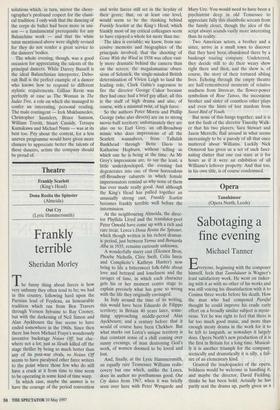Theatre
Frankly Scarlett (King's Head) Dona Rosita the Spinster (Almeida) Out Cry (Lyric Hammersmith)
Frankly terrible
Sheridan Morley
The funny thing about farces is how very unfunny they often tend to be; we had in this country, following hard upon the Parisian lead of Feydeau, an honourable tradition which ran from Ben Travers through Vernon Sylvaine to Ray Cooney, but with the darkening of Neil Simon and Alan Ayckbourn the line seems to have ended somewhere in the 1960s. Since then there has been Michael Frayn's wondrously inventive backstage Noises Off, but else- where not a lot; just as Sleuth killed off the stage thriller by being so much better than any of its post-war rivals, so Noises Off seems to have paralysed other farce writers to the point where those few who do still have a crack at it from time to time seem to be operating in some kind of time warp.
In which case, maybe the answer is to have the courage of the period convention and write farces still set in the heyday of their genre; that, on at least one level, would seem to be the thinking behind Frankly Scarlett at the King's Head, which frankly most of my critical colleagues seem to have enjoyed a whole lot more than me.
The idea is enviable; we know, from suc- cessive memoirs and biographies of the principals involved, that the shooting of Gone With the Wind in 1938 was often vast- ly more dramatic behind the camera than on the screen; the megalomaniac obses- sions of Selznick, the single-minded British determination of Vivien Leigh to land the leading role, Clark Gable's eagerness to fire the director George Cukor because they had once had a brief gay affair, all this is the stuff of high drama and also, of course, with a minimal twist, of high farce.
So the authors Peter Morris and Phillip George (who also directs) are on to strong movie-buff territory; unfortunately they are also on to Earl Grey, an off-Broadway mimic who does impressions of all the Scarlett wannabees, from Tallulah Bankhead through Bette Davis to Katharine Hepburn, without telling us which one he is being at the time. As Mr Grey's impressions are, to say the least, a little underdeveloped, the evening fast degenerates into one of those horrendous off-Broadway cabarets in which female impersonators remind us why none of them has ever made really good. And although the King's Head has pulled together an unusually strong cast, Frankly Scarlett becomes frankly terrible well before the intermission.
At the neighbouring Almeida, the direc- tor Phyllida Lloyd and the translator-poet Peter Oswald have come up with a rich and rare treat, Lorca's Dona Rosita the Spinster, which though written in his richest dramat- ic period, just between Yerma and Bemarda Alba in 1935, remains curiously unknown.
A wonderfully starry cast (Eleanor Bron, Phoebe Nicholls, Clive Swift, Celia Imrie and Complicite's Kathryn Hunter) now bring to life a bittersweet folk-fable about love and betrayal and loneliness and the ravages of time, in which each character gets his or her moment centre stage to explain precisely what has gone so wrong with the life they originally envisaged.
In Italy around the time of its writing, this would have been Eduardo de Filippo territory; in Britain 40 years later, some- thing approaching middle-period Alan Ayckbourn; and a century before that it would of course have been Chekhov. But what marks out Lorca's unique territory is that constant sense of a chill coming over sunny evenings, of man destroying God's work, of women doomed to be loved and lost.
And, finally, at the Lyric Hammersmith, an equally rare Tennessee Williams redis- covery but one which, unlike the Lorca, does its author no posthumous good. Out Cry dates from 1967, when it was briefly seen over here with Peter Wyngarde and Mary Ure. You would need to have been a psychiatrist deep in old Tennessee to appreciate fully this shambolic scream from the family closet, though the idea of the script always sounds vastly more interesting than its reality.
Two American actors, a brother and a sister, arrive in a small town to discover that they have been abandoned there by a bankrupt touring company. Undeterred, they decide still to do their weary show right there and then, and the show is, of course, the story of their tortured sibling lives. Echoing through the empty theatre are half-remembered moments of relative madness from Streetcar, the flower-power symbolism of Rose Tattoo, the incestuous brother and sister of countless other plays and even the hints of lost stardom from Sweet Bird of Youth.
But none of this hangs together, and it is not the fault of the director Timothy Walk- er that his two players, Sara Stewart and Jason Merrells, flail around in what seems increasingly to be a parody of all that once mattered about Williams. Luckily Nick Ormerod has given us a set of such fasci- nating clutter that one can stare at it for hours as if it were an exhibition of all Williams's leftover property. And that too, in his own title, is of course condemned.


































































 Previous page
Previous page